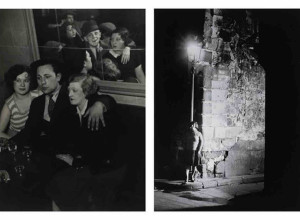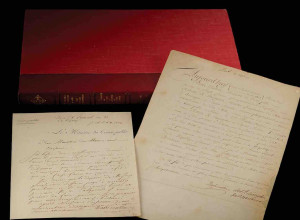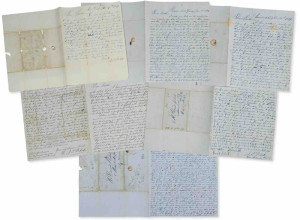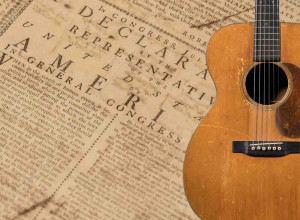Friday Reads: Three New Bookish Novels
Instead of a catalogue review today, I'm presenting short reviews of three bookish novels that I've had the pleasure to read recently. For those of you getting on a plane or train to New York for the book fair next week, stop at your local and pick up any of these or download to it your e-reader.
 Malcolm's Wine is a noir crime caper featuring "vintage wine, rare books, and sneaky people" from Philadelphia-based author-bookseller, Hugh Gilmore. I took this novel on vacation with me a few weeks ago and finished it in three days, leaving me bookless for the rest of the week. In the novel we meet Brian Berrew, a divorced bookseller living in Ann Arbor, and a bit of ladies man who is still grieving over the loss of his sixteen-year-old son. When his apartment is burgled on a night during which a local woman is murdered with a baseball bat, things get interesting. A host of quirky characters play a part in a zany drama involving a collection of stolen rare Americana. If you enjoy bibliomysteries, place your bet on Malcolm's Wine.
Malcolm's Wine is a noir crime caper featuring "vintage wine, rare books, and sneaky people" from Philadelphia-based author-bookseller, Hugh Gilmore. I took this novel on vacation with me a few weeks ago and finished it in three days, leaving me bookless for the rest of the week. In the novel we meet Brian Berrew, a divorced bookseller living in Ann Arbor, and a bit of ladies man who is still grieving over the loss of his sixteen-year-old son. When his apartment is burgled on a night during which a local woman is murdered with a baseball bat, things get interesting. A host of quirky characters play a part in a zany drama involving a collection of stolen rare Americana. If you enjoy bibliomysteries, place your bet on Malcolm's Wine.
 Glaciers is slim debut novel by Portland, Oregon author Alexis M. Smith. It was the book's cover that first sold me -- a dress made of cut-up text against a bright blue background -- and then I found that the main character works in a library doing book conservation and generally feeling a little out of place in her historical moment (Incidentally, this would have been a perfect description of yours truly about ten years ago). But there is so much more to story, layer upon layer that peels back like an onion, in language aptly described by Publishers Weekly as "lyrical and luminous." Though Smith may choose less bookish characters or settings in her next novel, she'll still be on my radar as one to read.
Glaciers is slim debut novel by Portland, Oregon author Alexis M. Smith. It was the book's cover that first sold me -- a dress made of cut-up text against a bright blue background -- and then I found that the main character works in a library doing book conservation and generally feeling a little out of place in her historical moment (Incidentally, this would have been a perfect description of yours truly about ten years ago). But there is so much more to story, layer upon layer that peels back like an onion, in language aptly described by Publishers Weekly as "lyrical and luminous." Though Smith may choose less bookish characters or settings in her next novel, she'll still be on my radar as one to read.
 Girl Reading by English debut novelist Katie Ward is creative and clever -- the author bases each of the seven chapters on seven portraits of women reading, from a painting of an orphan reading a prayer book in medieval Siena to a modern woman photographed reading at a bar, her photo uploaded to Flickr. All are inventive stories, well-written, and surprising in their depth. One reviewer called Girl Reading "demanding," and I would not disagree. With seven strong narratives to keep in mind--spanning the fourteenth century to the twenty-first--as well as their various subplots and tropes, a reader could feel overwhelmed. Then again, an abundance of intelligent literary fiction is nothing to complain about. (Read an excerpt here.)
Girl Reading by English debut novelist Katie Ward is creative and clever -- the author bases each of the seven chapters on seven portraits of women reading, from a painting of an orphan reading a prayer book in medieval Siena to a modern woman photographed reading at a bar, her photo uploaded to Flickr. All are inventive stories, well-written, and surprising in their depth. One reviewer called Girl Reading "demanding," and I would not disagree. With seven strong narratives to keep in mind--spanning the fourteenth century to the twenty-first--as well as their various subplots and tropes, a reader could feel overwhelmed. Then again, an abundance of intelligent literary fiction is nothing to complain about. (Read an excerpt here.)
 Malcolm's Wine is a noir crime caper featuring "vintage wine, rare books, and sneaky people" from Philadelphia-based author-bookseller, Hugh Gilmore. I took this novel on vacation with me a few weeks ago and finished it in three days, leaving me bookless for the rest of the week. In the novel we meet Brian Berrew, a divorced bookseller living in Ann Arbor, and a bit of ladies man who is still grieving over the loss of his sixteen-year-old son. When his apartment is burgled on a night during which a local woman is murdered with a baseball bat, things get interesting. A host of quirky characters play a part in a zany drama involving a collection of stolen rare Americana. If you enjoy bibliomysteries, place your bet on Malcolm's Wine.
Malcolm's Wine is a noir crime caper featuring "vintage wine, rare books, and sneaky people" from Philadelphia-based author-bookseller, Hugh Gilmore. I took this novel on vacation with me a few weeks ago and finished it in three days, leaving me bookless for the rest of the week. In the novel we meet Brian Berrew, a divorced bookseller living in Ann Arbor, and a bit of ladies man who is still grieving over the loss of his sixteen-year-old son. When his apartment is burgled on a night during which a local woman is murdered with a baseball bat, things get interesting. A host of quirky characters play a part in a zany drama involving a collection of stolen rare Americana. If you enjoy bibliomysteries, place your bet on Malcolm's Wine.  Glaciers is slim debut novel by Portland, Oregon author Alexis M. Smith. It was the book's cover that first sold me -- a dress made of cut-up text against a bright blue background -- and then I found that the main character works in a library doing book conservation and generally feeling a little out of place in her historical moment (Incidentally, this would have been a perfect description of yours truly about ten years ago). But there is so much more to story, layer upon layer that peels back like an onion, in language aptly described by Publishers Weekly as "lyrical and luminous." Though Smith may choose less bookish characters or settings in her next novel, she'll still be on my radar as one to read.
Glaciers is slim debut novel by Portland, Oregon author Alexis M. Smith. It was the book's cover that first sold me -- a dress made of cut-up text against a bright blue background -- and then I found that the main character works in a library doing book conservation and generally feeling a little out of place in her historical moment (Incidentally, this would have been a perfect description of yours truly about ten years ago). But there is so much more to story, layer upon layer that peels back like an onion, in language aptly described by Publishers Weekly as "lyrical and luminous." Though Smith may choose less bookish characters or settings in her next novel, she'll still be on my radar as one to read.  Girl Reading by English debut novelist Katie Ward is creative and clever -- the author bases each of the seven chapters on seven portraits of women reading, from a painting of an orphan reading a prayer book in medieval Siena to a modern woman photographed reading at a bar, her photo uploaded to Flickr. All are inventive stories, well-written, and surprising in their depth. One reviewer called Girl Reading "demanding," and I would not disagree. With seven strong narratives to keep in mind--spanning the fourteenth century to the twenty-first--as well as their various subplots and tropes, a reader could feel overwhelmed. Then again, an abundance of intelligent literary fiction is nothing to complain about. (Read an excerpt here.)
Girl Reading by English debut novelist Katie Ward is creative and clever -- the author bases each of the seven chapters on seven portraits of women reading, from a painting of an orphan reading a prayer book in medieval Siena to a modern woman photographed reading at a bar, her photo uploaded to Flickr. All are inventive stories, well-written, and surprising in their depth. One reviewer called Girl Reading "demanding," and I would not disagree. With seven strong narratives to keep in mind--spanning the fourteenth century to the twenty-first--as well as their various subplots and tropes, a reader could feel overwhelmed. Then again, an abundance of intelligent literary fiction is nothing to complain about. (Read an excerpt here.)















